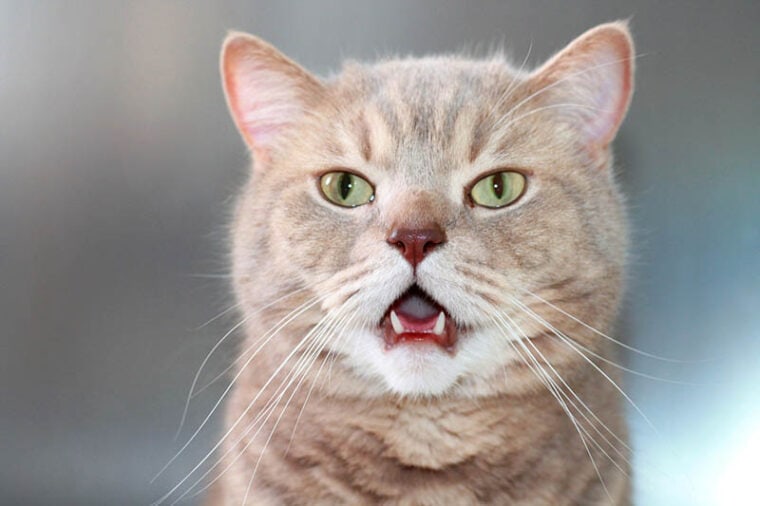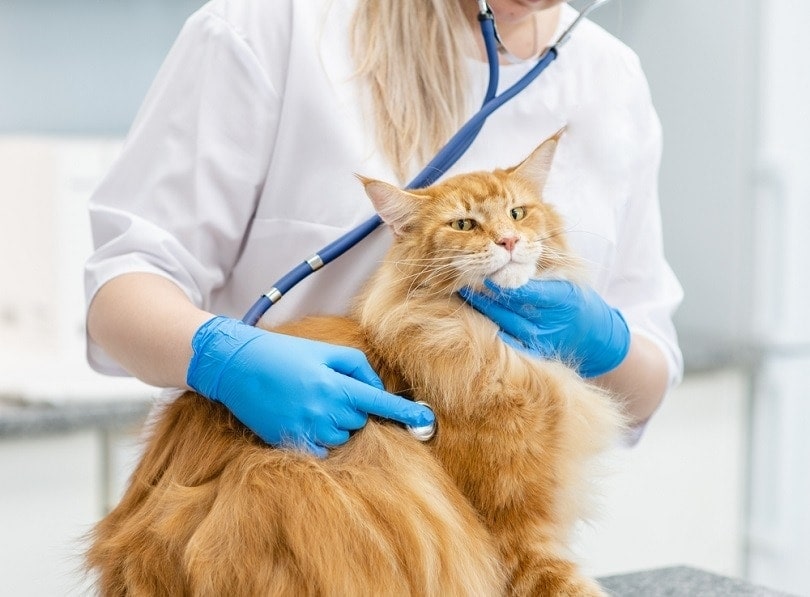
Healthy cats breathe around 15 to 30 times per minute when they’re asleep or resting. They naturally breathe faster when excited, playing, hot, or stressed. Rapid breathing is technically called tachypnea, and it’s not a disease in and of itself but can be a sign that your pet isn’t feeling well. Breathing issues in cats should always be taken seriously.
Cats often hide signs of illness, so when they start having trouble breathing, it can indicate that things have reached a critical juncture. Tachypnea often results from a lack of oxygen and can be caused by heart disease and anxiety. Contact your veterinarian immediately if your cat has trouble breathing; it’s considered an emergency. Remember that it’s never normal for cats to breathe heavily while resting.
Are There Other Signs a Cat Is Struggling to Breathe?
Yes. Tachypnea is only one of many signs indicating a cat is having trouble breathing. Wheezing and noisy breath sounds are always a cause for concern. Panting and labored breathing are also problematic. Abdominal breathing often indicates that a cat is having trouble drawing air. Heavy breathing when resting and open-mouthed breathing are both signs of severe distress.
How Can I Tell if It’s an Emergency?
Cats having trouble getting oxygen sometimes crouch low to the ground and stick their necks out. Others have exaggerated and labored chest movements when trying to breathe. Some pant and become scared. Blue gums and abdominal breathing often indicate severe oxygen deficiency. Serious breathing problems in cats should be treated as absolute emergencies.
What If It’s Not an Emergency?
Because breathing problems can indicate the existence of medical conditions, it’s essential to have your buddy seen by a veterinarian if the breathing issue persists, even if your cat otherwise appears healthy. Unlike dogs, cats will rarely pant.
Take notes to provide the veterinarian with accurate, detailed information about your cat. Be prepared to tell them approximately when the situation started, and take note of your cat’s activities, behavior, and diet to help with the diagnosis. Make sure to inform your veterinarian if your cat is showing other signs of illness, such as lack of appetite, lethargy, gagging, or coughing.
What About Stress, Exertion, and Heat?
Stress, exertion, and heat can all cause cats to breathe faster. There’s likely nothing to worry about if there’s an identifiable cause, and your cat’s respiratory rate should return to normal quickly after removing the source of the agitation. Keep in mind that panting in cats is never normal and is often an indication of overheating. Cats have different cooling mechanisms than dogs, and they very rarely pant. Cats are only able to sweat through their footpads. This is a very small area of the body, so it is not a very effective cooling mechanism. They also regulate their body temperature through grooming, which involves spreading saliva across the coat that evaporates, cooling them down. Therefore, if you notice your cat panting, get in touch with your veterinarian as soon as possible to get instructions on how to help them at home and how to travel safely to the clinic.

How Can I Measure My Cat’s Breathing Rate?
Count each completed cycle of inhalation and exhalation as one breath. Your cat’s chest moves up when inhaling and collapses on the out-breath. Measure your buddy’s respiration rate while they’re at rest to obtain the most accurate reading. More than 30 breaths per minute while resting or sleeping is considered abnormal.
What Causes Rapid Breathing in Cats?
Various conditions, including respiratory and heart disease, and stress, can cause rapid breathing in cats. It can even be linked to pain and allergies. Anemia, asthma, pleural effusions, tumors, and some metabolic conditions can cause tachypnea. Rapid breathing can also be caused by neuromuscular conditions and when cats have consumed toxic substances, such as acetaminophen.
How Is It Treated?
Cats experiencing trouble breathing often need to be admitted to the hospital. In these situations, veterinarians concentrate on stabilizing cats and providing supportive care. A very light sedation is sometimes necessary to make breathing easier. Oxygen is usually supplied by different methods. Anti-inflammatory medications and antibiotics are sometimes prescribed to address infections and inflammation. Tests are often run to identify the underlying cause after cats have stabilized.
How Are Underlying Conditions Diagnosed?
Veterinarians often use physical exams and information pet parents provide to form a diagnosis. Blood tests, urine tests, ultrasounds, and X-rays are often ordered. Further testing is usually required to pin things down.

Summary
Healthy adult cats breathe about 15 to 30 times per minute while resting. Tachypnea is the technical name for rapid feline breathing. Cats breathe more quickly than normal when excited, stressed, or after playing. However, rapid breathing can also be related to severe conditions such as heart disease and respiratory infections and should be evaluated by a veterinarian. Cats struggling to breathe often have blue gums and become anxious or panicky. If your cat has difficulty breathing, consider it a medical emergency and have them seen by a veterinarian immediately.
Featured Image Credit: Anastasija Goryainova, Shutterstock







